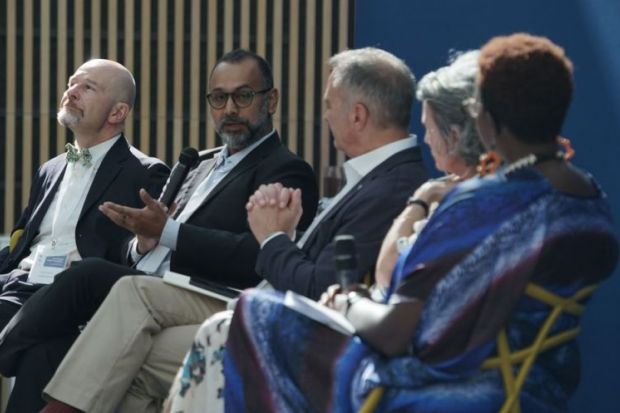International student mobility is affected by “deep biases” and is at the mercy of geopolitical tensions, it has been warned.
Sharan Singh, vice-president of strategic partnerships at the transnational educational programme Minerva Project, said that while the human element of overseas experiences was the most important part of student mobility, it was by its very nature exclusionary and was reserved for those with sufficient resources.
“The challenge before us is how to distil down the essence of what is beneficial and impactful for mobility and replicate that in a much more cost-effective manner,” he told the Reinventing Higher Education conference hosted at the University of Cape Town.
Mr Singh, who was responsible for building and leading Minerva’s partnership ecosystem, said mobility would shift from being either in-person or virtual to a hybrid model, and would be increasingly driven by the Global South.
The former director of institutional advancement and internationalisation at the University of the West Indies warned that there was deep bias embedded in global mobility.
This geopolitical impact was “impossible to miss” but was very hard to address as an individual institution, he warned.
“If you have a great president and a well-connected international officer, they can call in favours. But if you don’t have that, then you are at the mercy of the geopolitics,” Mr Singh said.
Another problem he outlined was that students could go abroad only to places where their institution had a relationship, while bias manifested itself even in where people choose to study – which often is just where their professor went to school.
“One of the remits to change the more traditional form of international mobility is to make it an institutional priority – not just the international office, or the rector’s office, or the president’s office,” Mr Singh said.
“It must be deeply embedded within the institution; the faculty must be trained to bring the world into your classroom.
“It is within the power and I think the responsibility of every single faculty member to immerse their students in the world that surrounds them.”
Valerie Amiraux, vice-rector for community and international partnerships at the University of Montreal, also spoke of the “dilemma” of international mobility at the conference, which was held in association with IE University.
Universities are based on revenue-centric models – with international students bringing in money almost everywhere in the world, but those students themselves often need substantial financial resources to travel, with fees that can vary greatly based on their nationality.
Her institution was also constrained by its “monolinguistic perspective” – that it is a francophone university – but, she said, it wanted to be open to the world and to welcome those who were not native French speakers.
“It also means being morally concerned and ethically aware of the fact that nobody has always the intellectual validity to think about moving,” Professor Amiraux added.
“It’s something that is sometimes very painful and it costs a lot, so you have to be aware of that to be an ethical institution.”




